The Bottom Line
Introduction: Welcome to Bastion
Anthem is one of the hardest games I've reviewed. We've held off on the review for a while to see if the game could improve from its disastrously frustrating launch. Alas, after a month or so after release, the game is still in a rather fractured and bewildering state.
Reviewing live games is always tough. They continually evolve and change over time, some of which have dramatic comeback stories. But enough time has passed to make a consensus on Anthem as it stands, and it's time to judge what BioWare has created.
Few games are as confused as BioWare's new IP. Billed by EA as a "genre-melding" experience, Anthem misses out on some of BioWare's best talents in favor of a new experimental online-only focus.
Anthem has been in development since around 2012 and represents the biggest, most ambitious leap BioWare has ever taken. The original vision was for a continually-unfolding world with deep lore, a unique story arc, larger-than-life action, and a sprawling quest across a unique sci-fantasy IP.
But there's only one problem: BioWare isn't yet ready to take on such ambitions. For Anthem, BioWare seems to have watered down their strengths in an attempt to create a monetizable online action game without actually understanding how these games operate.
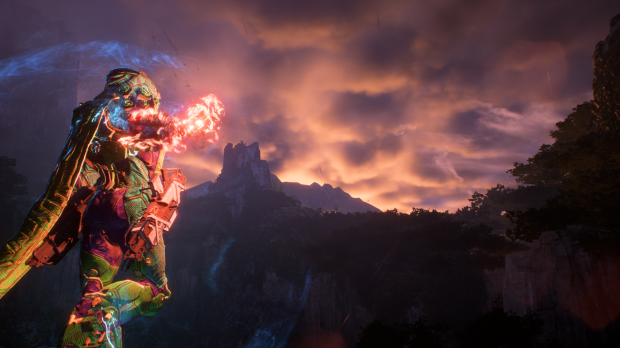
The developer mostly makes offline-driven RPGs where player choice dramatically shapes the world itself.
Some of BioWare's best experiences are made possible by the power of a singleplayer-only focus, which creates intimate, memorable moments that shift events in key ways. Things you do, what you say, how you build your character--all of these things have meaning in offline Bioware games.
In games like Mass Effect, you were in charge of your destiny, and choices you made felt human, felt real. You could identify with them, empathize with NPCs, and actually feel things. The made-up science behind Mass Effect's galactic romps were believable because the game created an environment that made us comfortable with dispelling our belief. Mass Effect is a place of interstellar joy that taps the inner astronaut and star-hopper in all of us, that part of us where we look at the stars and wonder what's out there. That was part of the magic.
Dragon Age's mystical lore pulled me in like a gravity well, placing me in a world of myth and magic on the brink of total destruction. Internal politics, culture clashes, and a rich cast of characters immersed me into a faraway land of fantasy. I knew it wasn't real, but it felt real because BioWare awakened my imagination. It was like stepping into an original J.R.R. Tolkien novel.
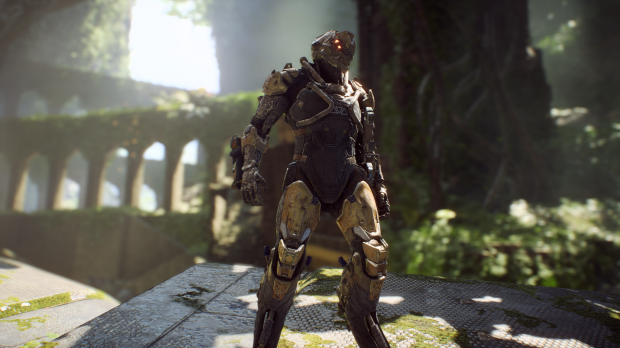
But in Anthem, a game with millions of players, these things aren't possible in the same way. It's nearly impossible to make everyone's experiences unique, to have a choice-driven story while the team tries to handle the wild, untamed beast that is live gaming.
BioWare's magical formula has been dispelled by the stark reality of an awkwardly-designed online-only service game. The studio is simply trying to do too many things at once, and the entire core experience of Anthem suffers for it.
Anthem is more of a mass-market casualization of everything BioWare is known for, an experiment that sees the developer carving up its most potent powers and trying to spread them across too many areas. The result is a dramatic dilution of BioWare's strengths. If games like Mass Effect and Dragon Age are roaring rapids, then Anthem is a mild stream.
BioWare trades its beloved and well-known RPG mastery for the more accessible action, and the results are actually impressive. But the studio simply doesn't understand how shoot-and-loot live games should operate, and decided to force things to fit together.
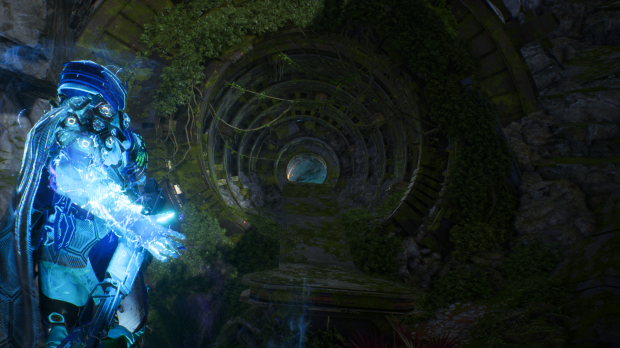
Instead of the continually-evolving world we were promised, Anthem's fantasy world of Bastion doesn't yet live up to its potential. While beautiful, the world is far from a living, breathing sandbox that makes you forget you're playing a game.
Anthem's worst sin is how it handles grinding and endgame progression. The game simply doesn't give players a reason to return. The entire motivation to keep playing live games like Anthem, Destiny, and The Division is to collect more loot and try out new abilities in unique ways, but Anthem's lack of RPG elements and tedious, meticulous grinding simply deters players.
The game starts to feel like less of an actual experience and more like work. There's nothing new to really do other than keep running the same strongholds in search of more loot, but what's the point if that loot won't make the game more meaningful?
This is the real dichotomy that Anthem players are faced with. There's no sense of empowerment here, and not a lot of reason to keep playing. This spells doom for most service games that rely on engagement, but we'll talk more in-depth on that in page 4.
It's for these reasons--and many more that I'll outline in this review--that I think Anthem should've been a singleplayer game with optional online elements. All of the threads are there, and BioWare obviously wanted to do more with their ambitious dream, but like Mass Effect: Andromeda it missed its target by a long shot.
Game Mechanics: Iron Man Splendor
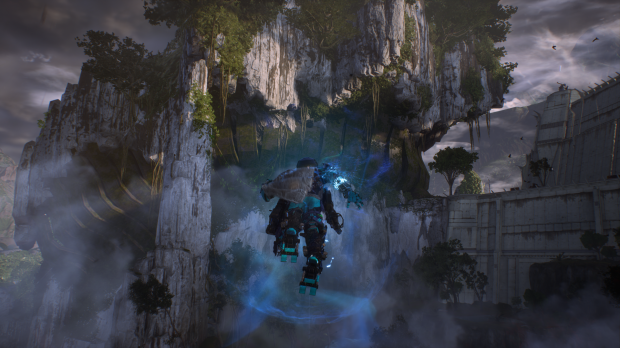
Anthem's overall game mechanics are immensely satisfying. BioWare has crafted an extremely competent action game with enthralling combat that's just as enjoyable solo as it is with friends. Gamers can zoom around the incredibly vivid open-world in their Javelin mechsuits like Iron Man, whizzing through the heavens and deftly barrel-rolling into crevices.
Flying around in Anthem is one of its strongest points, and makes for a liberating and unique experience. You can flash across the world in your portable jetsuit mech, careening over hills, rivers, waterfalls and rocky outcrops, and then break into a hover to blast enemies with gunfire or magical powers.
Combat is fast, fluid, and chaotic. Each Javelin mechsuit gets two skills to use and they're quite explosive, offering unique strategic innovations here and there. BioWare's penchant for combos is back in full force, and there's a dizzying array of cross-class mix-and-match tactical potential. The attacks can be combined with your friends' abilities to dish out serious damage over time, such as burning baddies with fire combos or freezing them whole with ice attacks.
Triggering combos is one of the most fun things about the combat and it's actually quite engaging. At it's core, Anthem feels kind of like an arcade game that's built around one simple premise: destroy everything in sight. It's here where the game's motivations are most pure and electrifying, and during these sequences you forget about its problems.
For a time, at least.
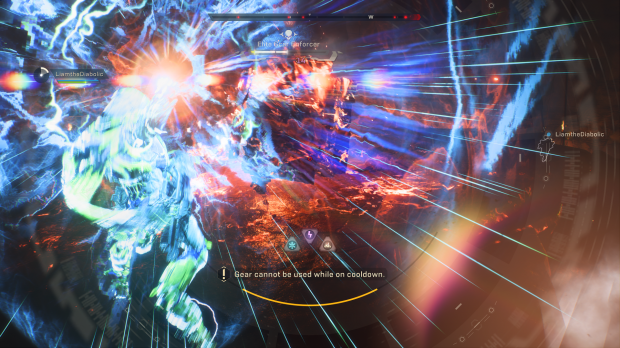
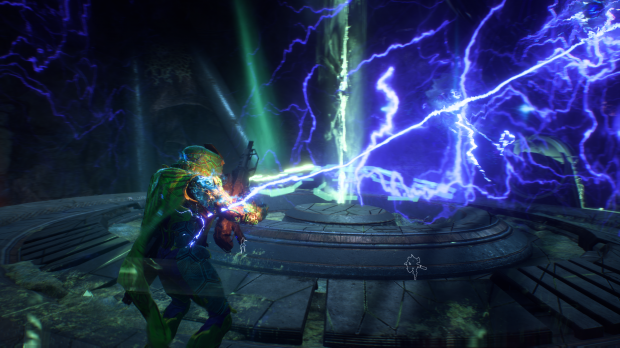
It's clear that BioWare put almost all of its focus onto combat. Anthem is basically the result of BioWare displacing its talents: instead of strong RPG content with unique stories, characters, and meaningful choices, they've put more emphasis on action this time around. It's kind of a carry-over from Mass Effect: Andromeda's focus.
In a lot of ways Anthem borrows from Destiny's space wizard feel, but with more of a fantasy bent. There's a mystical quality to everything in Anthem, as if it's a mixture of both Mass Effect and Dragon Age (and in many ways it is). Combat is empowering and fun and genuinely stands as one of the more impressive features in any recently released game.
The real shame about Anthem is how everything else is executed.
Outside of the incredibly vibrant world and the havoc-filled combat, Anthem is a mess. The amazing combat actually serves as a sharp contrast to show just how bad its other features are, the same way a student with a high GPA can throw off the curve for the entire class.
There's some seriously bad design decisions present in Anthem.

The game has barely any of the RPG elements BioWare games are known for. There's no meaningful progression outside of a blind, tedious and frustrating loot grind--no skill points, no real EXP progression upgrade path. Like Path of Exile or Final Fantasy VII, your usable abilities are tied to item loot drops that all have myriad of grades and random stats and bonuses.
This way gamers have to keep playing over and over to find the skills they want to use.
As you level up you just unlock new Javelin classes to use and slots to equip components to give passive bonuses to your Javelin. You can't equip armor pieces--armor is just cosmetic and built specifically around monetization--and guns give mediocre and very basic stats and bonuses.
There's no actual in-depth stats, for that matter. Anthem feels very pedestrian and a step backward to games like Destiny, who give you a baseline understanding of how your gear is affecting your character's prowess in battle. This takes away one of the most potent engagement patterns for any live service game: min-maxing builds.
If a piece of gear gives, say, +40% shields, there's no actual way to check how much your shields actually went up. Everything feels artificial, fake, almost like an illusion to make it seem like you're progressing. Every stat bonus is like this and really makes the game feel incomplete.
Anthem doesn't even tell you how much max health or shields you have. This is absolutely absurd.
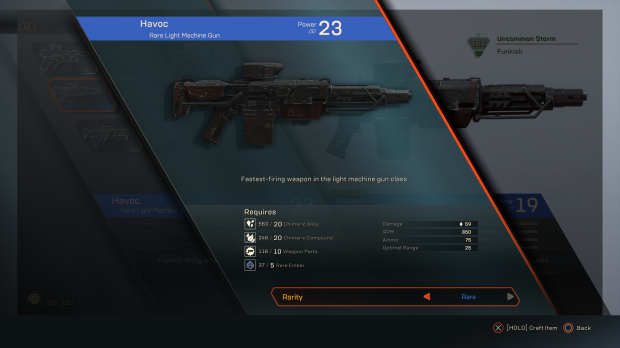
This radically contrasts with the strong empowerment that combat brings. If gamers can't actually see the material net benefits of gear in a straightforward way, it strips away one of the core freedoms that all progression-based live games desperately need. In-game numbers mean a lot when they translate to specific in-game performance, and here Anthem just keeps us guessing.
To actually make progress, players need a tangible point of reference for their growth. Or else there's really no meaningful progression taking place outside of the vague Power system, which raises your overall level rating based on how many higher-level pieces of gear you have equipped.
So progression is inherently flawed and pulling itself in opposite directions. The Power system makes you want to equip the highest-level guns, components, and abilities just to boost that number up. But those guns might not be what you like to use, and those skills might not actually trigger combos. It's a catch-22 that works against itself to make Anthem more frustrating than need be.
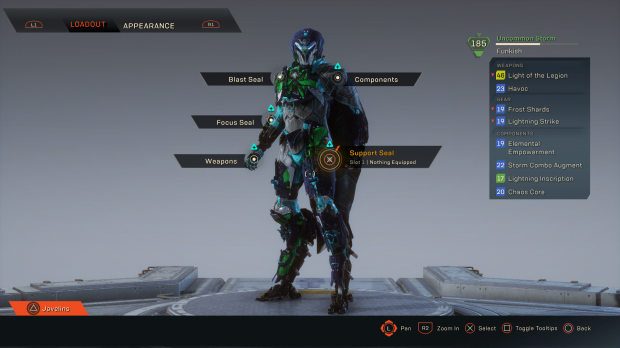
One of the most annoying things about Anthem is you can't actually switch guns or skills while playing missions or roaming around the world map. Games like Destiny let you instantly swap out your guns, armor, or skills for specific situations.
But Anthem, being the confusing mess that it is, forces players to go to a non-interactive Forge hub to swap things out.
This is built around the mindless loot engagement strategy that BioWare has instilled within the game; the idea is by forcing gamers to go to a central area to swap gear out, that they'll be more likely to customize their Javelins with monetized skins, scrap gear they don't need to use and ready themselves for the ever-present loot quest, and then experiment with new abilities.
When these abilities end up being terrible choices, you're stuck with them for the entire session. Or you could just close the game out (which is what many gamers choose to do).
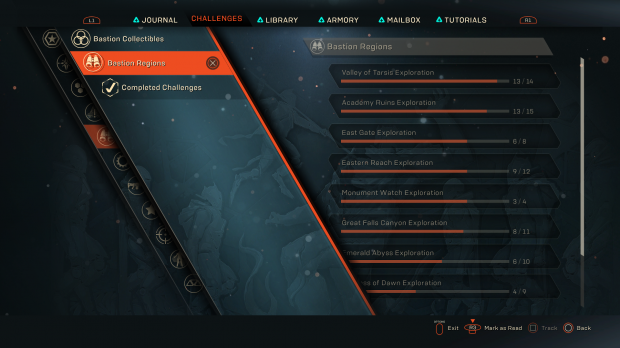
Anthem's menus are also badly designed and UI and world-based navigation are more complex than they need to be. The game absolutely bombards you with challenges and extras, making for a mess of vertical menus and junk that just clutters everything up.
The map is also needlessly frustrating. Everything in Anthem is online-hosted, including the UI, so there's always a bit of lag when you open the map and see where you're going. The real problem is there's no mini-map to accompany the compass bar. Anthem is a vertical game with dimensional flight, so a crappy limited compass bar isn't going to relay enough info.
A mini-map would dramatically help things and orient gamers as they try to traverse the massive world. You often feel like you're flying blind, and finding particular points on the map--like the Tomb of Artinia--can be a nightmare. Part of me thinks BioWare hindered navigation on purpose so we'd be more tempted to explore and check things out...but this, like many of the devs' decisions, backfired.
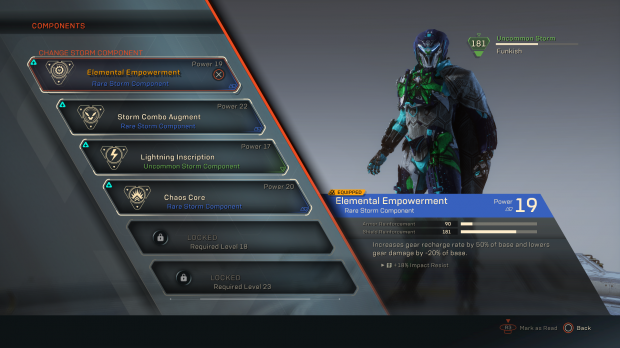
And finally let's talk about the loading screens.
Online-only games will have loading zones. That's to be expected. But Anthem's are graceless and rather long: they're just screens with a stock image and a moving bar and no flourish. Sure they've gotten better since launch, but they're always there, waiting to interrupt your sessions, your time, and ultimately fracture your experience.
There's loading zones when you complete a mission, loading triggers when you flag too far behind your team, and loading zones between cinematic sequences. The Forge loading has been significantly reduced, though, which is a huge plus.
Nothing breaks the immersion more than literally halting your gameplay with bland, non-interactive sequences. And Anthem does this frequently.
All of these things make for a bewildering, confusing, and plain annoying series of roadblocks that severely inhibit the flow of combat, progression, and overall enjoyment.
The World: Anthem's Bastion is Exotic and Enchanting
One of Anthem's saving graces is the majestic and sprawling fantasy world. BioWare has proven to be masters of art direction and world-building, and I'm absolutely spellbound by Bastion's strange, bold frontier.
BioWare's crafted sandbox is enchanting in its scope and visual presentation. Weird cyclopean machinery breaks through the ground, speaking to some hidden secrets from the stars. Bastion has a vibrancy, a beautiful color that manifests into one of the most impressive in-game worlds I've ever seen. Tropical plants sway in the breeze and waterfalls crash to great chasms deep in the earth. Strange wild creatures fly the skies as monsters maunder the ground searching for prey.
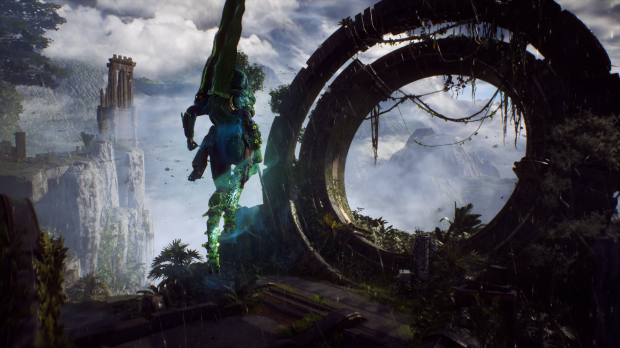
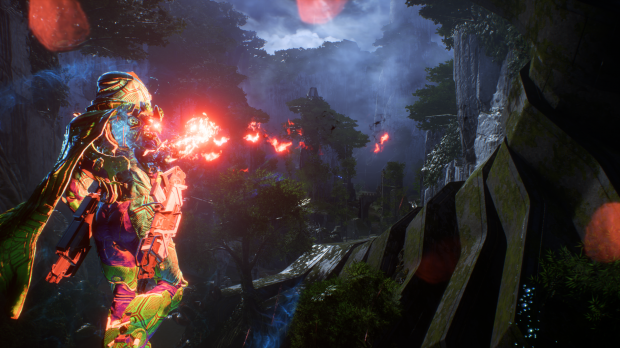
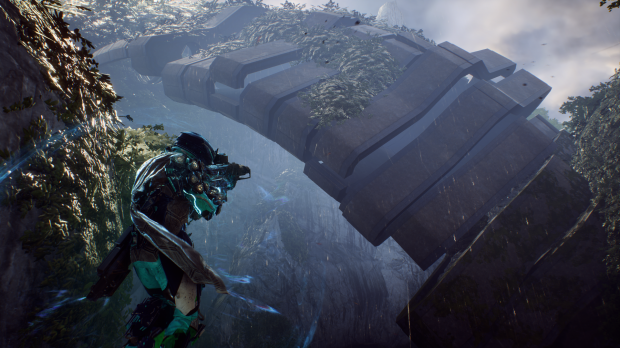
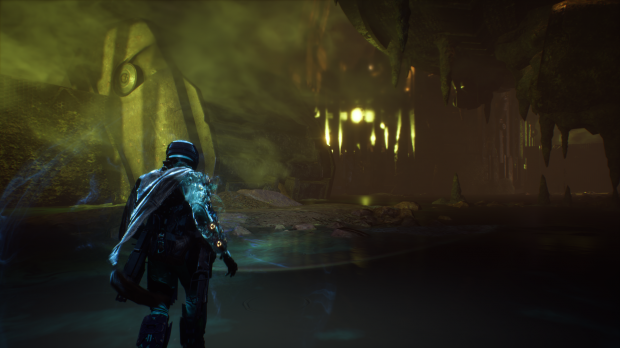
The world not only looks alive, but it feels alive.
There's a spirit here, a kind of electricity, a testament to a dream almost-realized. One can almost feel the potency of BioWare's magic spells as if some great wizardry was used to craft this expanse.
Each area has its own name and attachment to the universe; there's a significance to every place, whether it be ruins from some great academy of sorcery, a battlement that withstood an ancient war, a sunken city that time forgot, or the rusty, corroded cosmopolis of the Scar.
There's lots of meaning to be uncovered throughout the world, but you have to look for it, seek it out.
This mythical realm brings a sense of roaming mystery that awakens the intrepid explorer within all of us. I've had some fantastic memories cruising across Bastion with my HUD turned off, blasting through alien tunnels to uncover strange relics, drift through the incredible underwater areas with their bioluminscent fish, and soaring into the sunset.
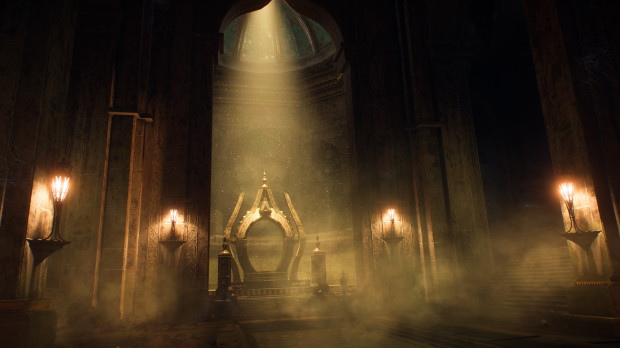
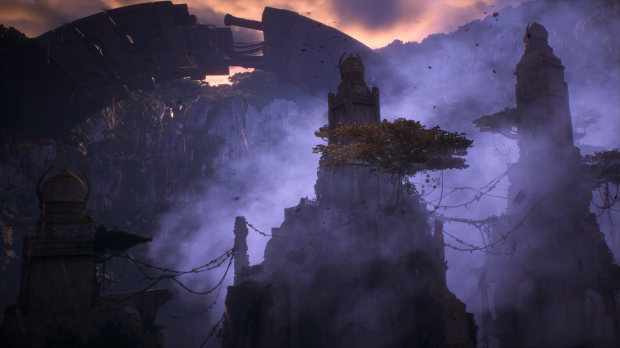
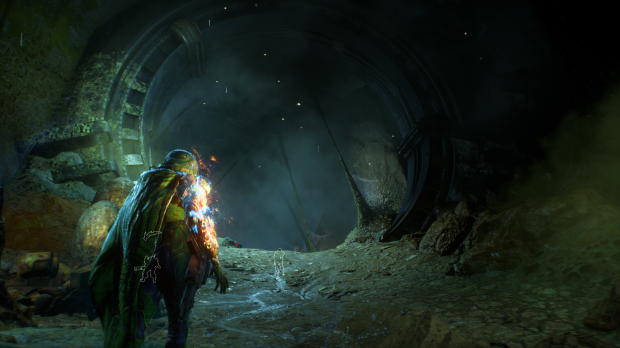
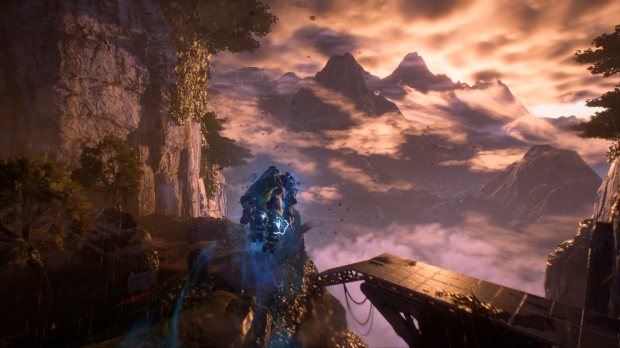
There's magic here in these hallowed medieval halls, in this land riven by mountain-shattering storms, in this universe that marries Isaac Asimov's deep futurism with J.R.R. Tolkien's high fantasy. I always find something interesting to check out in Bastion. I'm always beckoned to travel down a path, or fly through a Shaper doorway or even jump into a puddle. You never know where Anthem's world will take you, and that's really the beauty of it.
I particularly enjoy how Anthem's world is blended with the game's lore. Anthem's story might not be so dynamic and in-depth as we expected, but the lore itself has a kind of unique potency to it. Bastion is steeped in legend and a kind of sprawling history that lives outside of anything BioWare has made.
BioWare clearly tried to create something fresh, something interesting, and I have to say it's worked. There's some of that old-school BioWare flair to be found here but you have to look a bit harder to find it.
Anthem's lore tells of a force called the Anthem of Creation, a nebulous glowing conduit of pure power. It created Bastion and the world itself, and there's myths surrounding it and the mysterious Shapers (kind of like the Forerunners in Halo). It has the power to create, or to completely destroy and create something else by proxy.
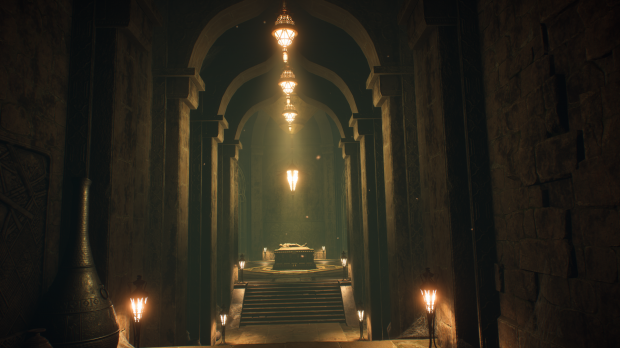
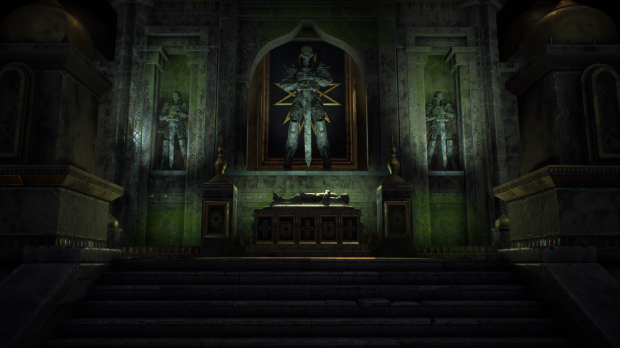
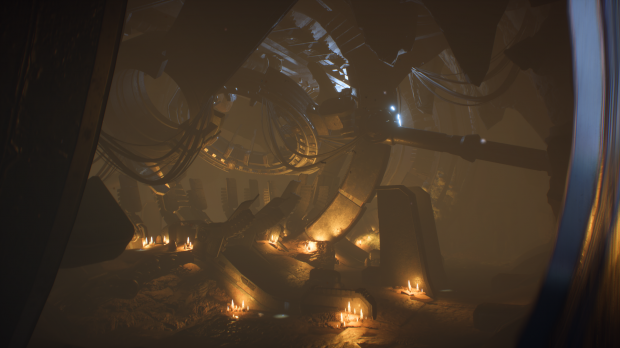
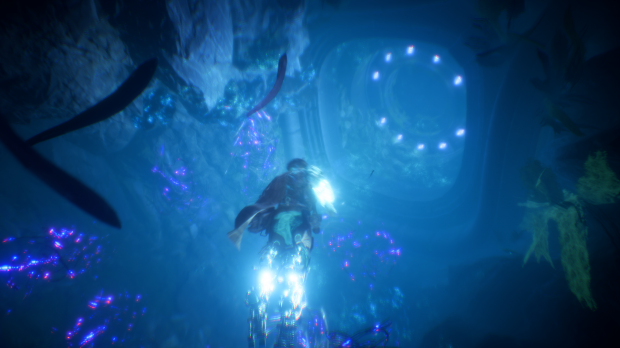
Thanks to technological prowess, man enjoyed a golden age of prosperity, but ambitions went too far when it tried to harness the Anthem of Creation. This event kicked off an explosive everstorm called the Heart of Rage, a persistent maelstrom that wreaks havoc upon Bastion. You see the Heart of Rage throughout the story and actually move to quell its stormy heart.
The lore also speaks of legendary warriors like General Tarsis and her Legion of Dawn. Throughout the story you actually go to each of their tombs to uncover secrets (rather drab mechanically, but armed with lore the environments take on new meaning). And as you play, new lore opens up and gives you more pieces and tidbits about the world itself.
Seeing these relics and pieces of history manifest before your eyes gives the world much more meaning. There's a deeper view to see in Anthem, but you have to sift through its tedious menus and read a bunch before you uncover it. But once you do, the game becomes much more immersive. It's just BioWare hasn't exactly presented the material in the best way.
Anthem Fails as a Service Game, Here's How to Fix It
Anthem currently fails as a service game.
It hasn't properly engaged its audience or re-engaged the gamers who have left. Players are upset about the rather stingy drop rates, and everything feels artificially elongated in a way that's detrimental to the overall experience. Right now, Anthem isn't set up to be the long-term revenue generator BioWare had hoped it'd be.
The game is specifically designed to earn money over time via optional cosmetic purchases, but like Fallout 76, the game is missing one crucial component: meaningful fun.
Analyst firm SuperData recently gave visibility into Anthem's monetization performance. Out of the $100 million Anthem generated from game sales at launch, only $3.5 million of those earnings were from microtransactions. That means the game monetized at a rate of 3.5% during its critical release period. That's not so good, and that number has likely dropped as bad press, reviews, and feedback has taken hold.
Ultimately BioWare just doesn't understand how to make live games. And that's okay, because this is their first time. It's a hard lesson to learn for sure, and to competently run any live game, devs must inhabit three different time periods at once: the past, the present, and the future.
Here's a quick breakdown:
- The Past - Devs must always pay attention on what went wrong and right in previous periods
- The Present - Devs must use what they've learned to create enjoyable experiences for gamers in the now
- The Future - Devs must constantly plan ahead and lay out new content, all of which can be disrupted or aided by decisions made in the past and present phases
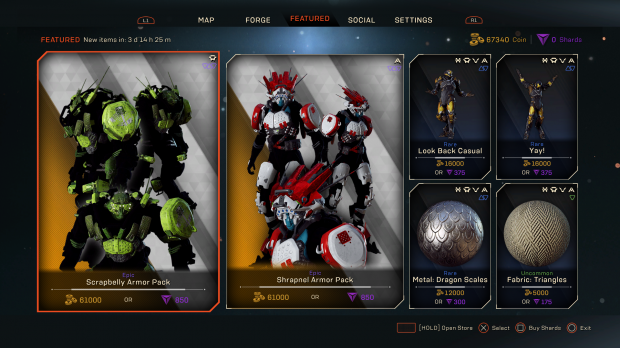
Anthem is monetized via optional cosmetic skins that can be purchased with real money via a premium currency called Shards.
That's not it, though. That's just the content maintenance and creation phase. The most critical element to any live game is to create meaningful fun. You can't monetize a game before your audience is engaged, and you can't engage an audience if they're not having meaningful experiences. And more importantly, you can't infuse too many "hooks" to force engagement.
BioWare has simply tried to force engagement by bombarding players with a frustratingly tedious loot grind. Any loot grind needs to be carefully balanced; devs have to make sure things aren't too crazy, but at the same time they can't withhold too much. The flow has to be just right.
Right now Anthem's flow is just a trickle and it's severely disrupted the endgame phase. The endgame phase is absolutely critical to any live game, and how gamers continue repeatedly engaging with your product after the main content is consumed will make or break your service title. Some would argue Anthem doesn't even have an endgame, and they'd be partly right.
The problem is there's really not anything left to do in Anthem besides run particular objectives over and over. There's no trading, no real raiding presence, no dynamic quests that have meaning that shape the world, etc.
Gamers are simply spending too much time doing endgame content without getting adequately rewarded. Players are repeatedly playing the same strongholds on the highest difficulties in the hopes of getting better gear, creating a rote loop of play that's burning many people out. If you can't reward your playerbase, they'll simply quit, and deterrence is the death of all live games.
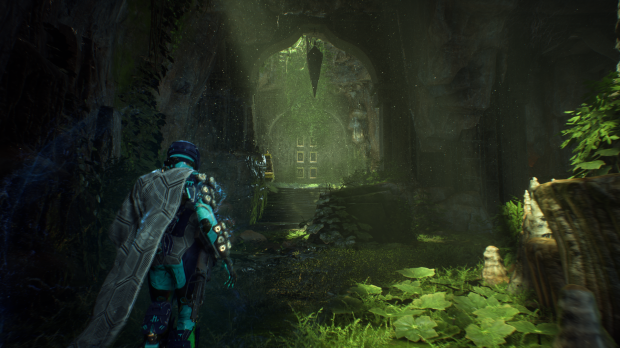
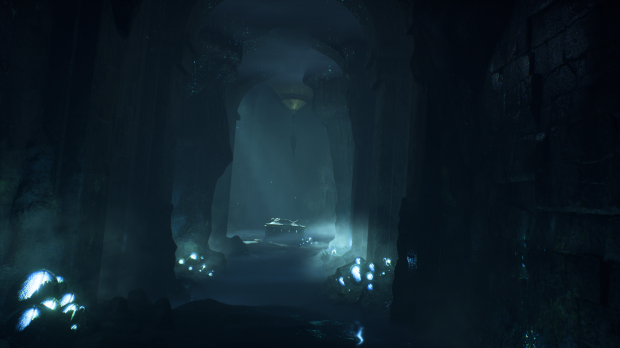
There's just not enough loot being distributed, and it's not like Anthem doesn't have an insane amount of randomized gear to collect. That's the main driving force behind the loop, after all, which is actually the most disappointing part of the game itself. It's a loop without much actual substance. The crafting doesn't help anything either, and the Dragon Age: Inquisition style material gathering is tedious and annoying.
What makes Anthem's loot grind particularly damning is the game's lack of stats or meaningful, tangible progression. Even if you find the best Masterwork of Legendary gear in the game, it doesn't add to a pool of viewable stats, which is a huge missed opportunity for player satisfaction. Finding the best gear should always be punctuated by concretely showing how a character has grown. The easiest way to do this is simply show the before and after stats.
So Anthem isn't properly engaging players because of the loot grind issue and lack of endgame content. There's not a lot of meaning to the experience, and the fun is being drowned out by the repetitive nature of the game. BioWare's IP simply wasn't set up to meet all of its lofty goals, and therefore it won't succeed as a live game unless it makes some big transformations.
And as we know, Anthem can't yet be comfortably, consistently monetized before it's engaging and fun. Not one or the other--it has to be both.
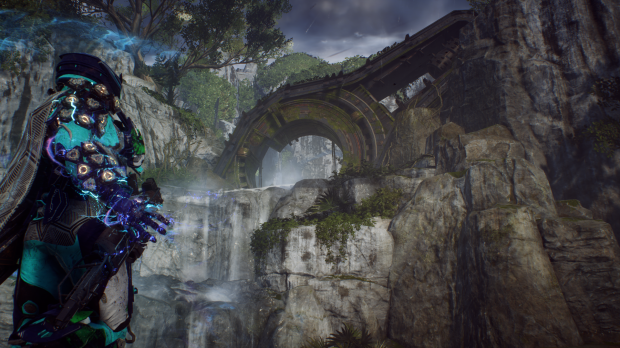
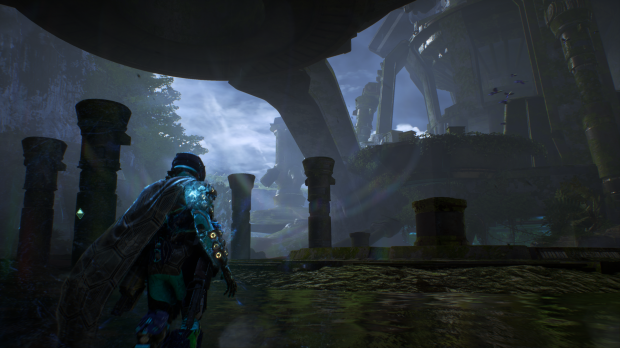
How to Fix Anthem
But all hope isn't lost. BioWare can turn this around. They've already created a core framework--the world is there, the combat is there, the weapons and skills and overall system is there. They just need to significantly tweak it over time while listening to the playerbase.
Here are a few ways BioWare can fix Anthem:
Let us see our stats: This is incredibly important. How can we measure how much we've grown without knowing how weak we were beforehand? I don't mean weapon damage stats or the vague Power mechanism; give us real-time stat tracking that shows us health, shields, resistances, and overall DPS in a clean, easy-to-read layout.
Turn on the loot shower: If gamers want loot, give them loot. They're on a quest that sees them spending their most precious resource, time, on your game. Don't waste their time.
Inject meaning into loot grinds: Attach story missions, lore, or other innate immersive aspects to the loot. Make weapons only findable in certain locations at certain times or from certain quests, use your magical world to bring new inventive ways to infuse the weapons with new energies. We need a reason to grind besides just getting better loot--make it fun, get creative, and most of all, add meaning to our endgame experiences.
Add more unique things to do in the world: Anthem's world is incredible, but it's not very interactive. You need to change that, BioWare. Add more secrets, add doors that only open up on a certain day, add more secrets and strange things and make good on your promise to create a living, breathing world. Take a page from Fortnite and have timed/weekly world events that actually change the world in unique ways. Have a cyclopean titan blast in out of nowhere, have a mysterious light that attracts players, create something that keeps us excited and buzzing and talking.
More endgame content: This is the hardest to solve. I'm sure BioWare has plans for this, but we need them ASAP and we need something better than replayable harder missions and the loot grind. Create timed boss-level events that are unique, difficult, but also rewarding in other ways besides loot. You have to get creative to solve this one; the content has to be fun too.
All of these alongside smaller quality-of-life improvements like a mini-map and a cleaner UI will go a long way to breathe new life into Anthem. Like I said, the core is already there, but the house still needs a lot of work before it's ready for a big party.
BioWare, Don't Give Up
Even with all of its problems, BioWare shouldn't give up on Anthem. The game is the result of many long years of hard, devoted work. It clearly shines with multitudes of effort and sleepless nights. Anthem is a beautiful, majestic visual experience that exposes masterful world-building melded with intuitive, fun combat. But it suffers badly in the live game aspect.
BioWare's come way too far to quit now. The only way Anthem really truly fails is if BioWare gives up on it, if they drop it and move on. But they've invested far too much manpower, years of hard work, and money to just nix the project. No, the studio has to keep going.
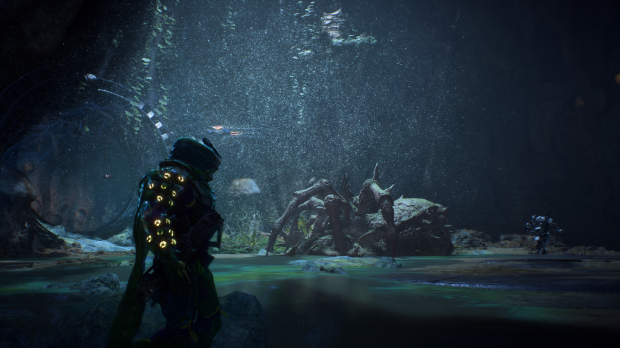
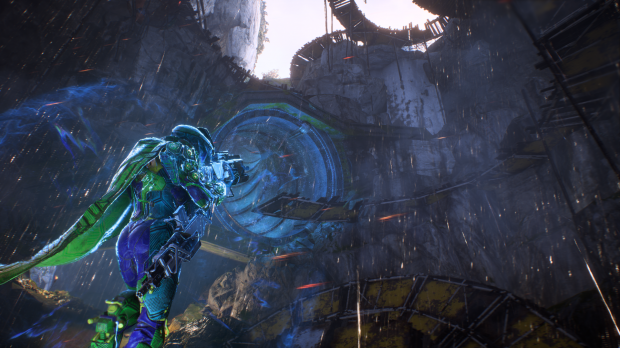
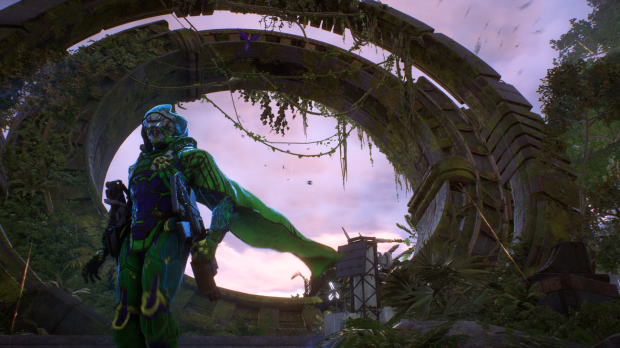
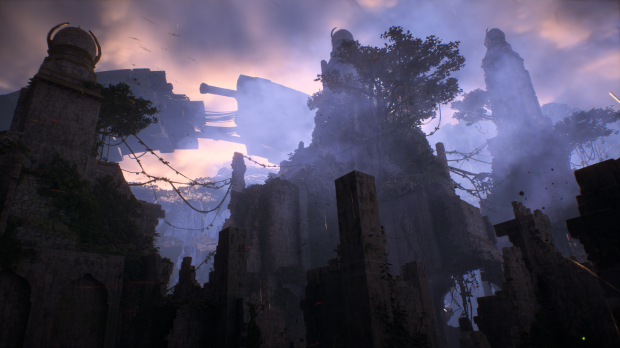
Ultimately we should support BioWare and encourage them to continue working hard. The Anthem community is doing this in their own way. Despite the banter and the lambasting, there's genuine feedback to be found amid the negativity.
I'm reminded of a recent GDC speech from No Man's Sky's Sean Murray:
"Innovation is in such short supply in the industry. We need it so badly, we need to encourage it, we need to foster it. We need to ask people to shoot for the moon."
"And if they fail on their first attempt, we need to be there to support them. We focus far too much as an industry on week one sales and so little on long-term impact. We're all making games in the most polarized and intense moment in gaming. And it can be scary."
BioWare shot for the moon, and they missed. But they took the chance. It takes courage to act, to try and manifest your dreams into a reality, and while some say BioWare may not deserve our time or money, they certainly deserve our respect.
"Courage is going from failure to failure without losing enthusiasm," Les Brown once said.
I'm confident the studio can turn things around. Armed with EA's know-how, its own talented developers, and community feedback, we could see Anthem become the game it always should've been. We could see it become the game BioWare dreamed of way back in 2012.
The beauty of live games is that they can continue to grow over time. Yes, BioWare needs to be criticized, and yes, Anthem is a hot mess right now. And yes, the game feels like a kind of advanced beta test with janky features that shouldn't be in a $59.99 release. And no, we shouldn't give BioWare a pass just because they took a risk and tried to make their dream game.
But we should respect them enough to try and guide them through the process. BioWare can't turn things around without our help, without our encouragement.
Like all developers and gamers out there, we're all in this together.
Final Thoughts
Anthem isn't in the best shape right now. It's playable, and it can be enjoyable, but it's not something I'd recommend you play for the long term. Yes, Anthem is gratifying in small doses, and yes, it's an explosively chaotic shooter that adds a flavorful twist on the action genre.
But the problem is that flavor doesn't last. Once you get sucked into the loot grind, Anthem has a particularly bad taste and gamers shouldn't keep chewing on it.
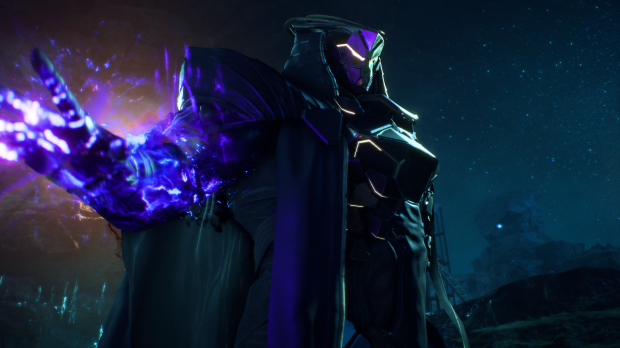
BioWare has created something different with Anthem. They've departed from their well-worn path to try something new, something wildly ambitious. They didn't meet their goal yet--I'm confident they will eventually--but we can't review a future game. We can only judge what we see now. The studio's ambitions for a constantly-shifting experience that can be monetized over time ultimately failed to manifest, and as it stands now, Anthem is something of a spectacle in the industry.
Anthem does have its redeeming qualities, though. Features like immaculate flight, an incredibly vibrant open world, unique lore, and chaotic action are the high water marks to remind us BioWare can and will deliver impressive experiences. These can't stand on their own, though, and only serve as benchmarks to illuminate the weak, frustrating points the game suffers from.
BioWare proves it's still adept with its magic wand, but Anthem's spell wears off quite fast.
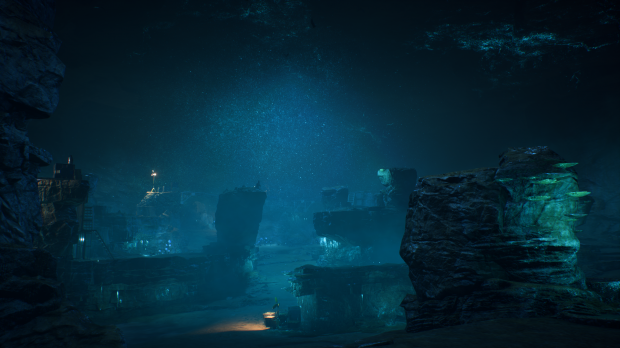
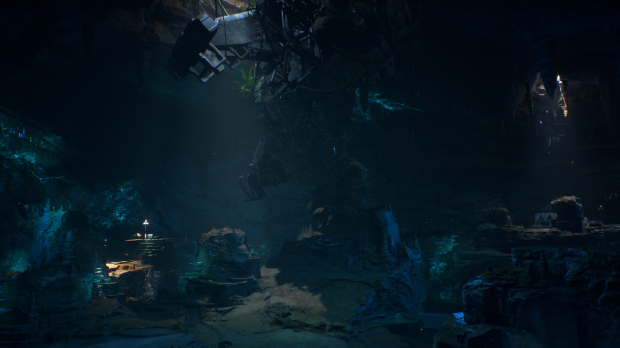
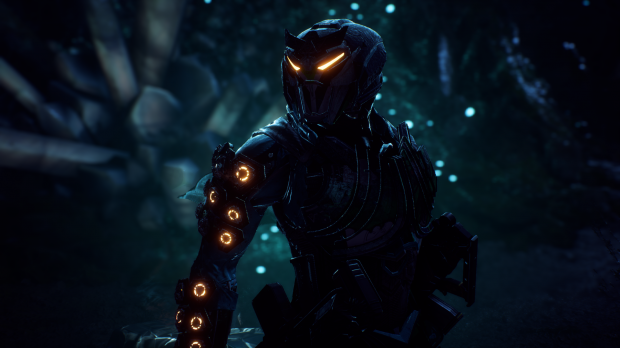
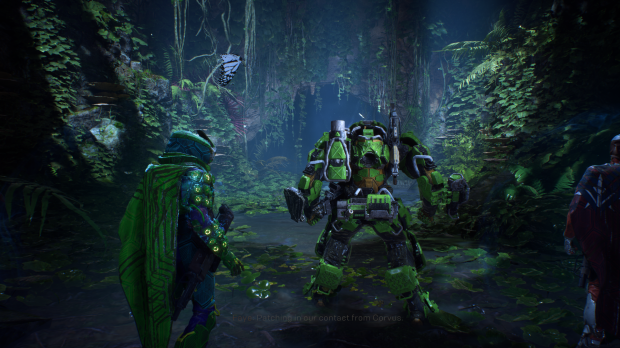
Can BioWare save Anthem? Yes, they can. Will they? I hope so. Should you buy Anthem? It depends on what you're looking for. Want to play it casually? Go ahead. But if you want a hardcore loot grind with meaningful gameplay and a sprawling experience you can enjoy for 100+ hours...you may want to reconsider.
What's Hot
+ Combat is tons of fun with friends or solo
+ World is enchanting and beautiful
+ Lore is interesting and unique
+ Graphics are impressive, lighting and atmospheric effects are fantastic
+ Flying is immaculate
What's Not
- Loot grind is tedious and boring
- Lukewarm story arc
- Lack of endgame content
- Core gameplay seems meaningless
- UI, navigation are confusing
- Can't swap out weapons on-the-fly
- No RPG level stats
- Loading screens are irksome
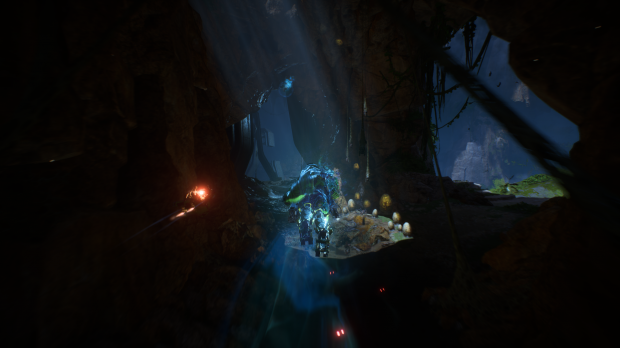
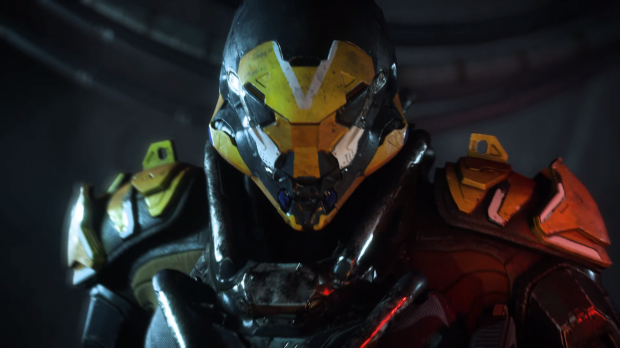
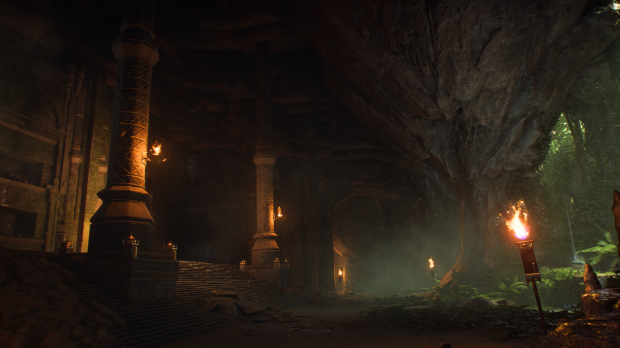
| Graphics | 90% |
| Fun Factor | 55% |
| Game Mechanics & Combat | 90% |
| Engagement Value & Replayability | 45% |
| Overall | 70% |
The Bottom Line: Anthem is a casualization of BioWare's best strengths, but can be explosively fun. Best enjoyed in small doses.
PRICING: You can find products similar to this one for sale below.
 United
States: Find other tech and computer products like this
over at Amazon.com
United
States: Find other tech and computer products like this
over at Amazon.com
 United
Kingdom: Find other tech and computer products like this
over at Amazon.co.uk
United
Kingdom: Find other tech and computer products like this
over at Amazon.co.uk
 Australia:
Find other tech and computer products like this over at Amazon.com.au
Australia:
Find other tech and computer products like this over at Amazon.com.au
 Canada:
Find other tech and computer products like this over at Amazon.ca
Canada:
Find other tech and computer products like this over at Amazon.ca
 Deutschland:
Finde andere Technik- und Computerprodukte wie dieses auf Amazon.de
Deutschland:
Finde andere Technik- und Computerprodukte wie dieses auf Amazon.de
Similar Content
Related Tags

